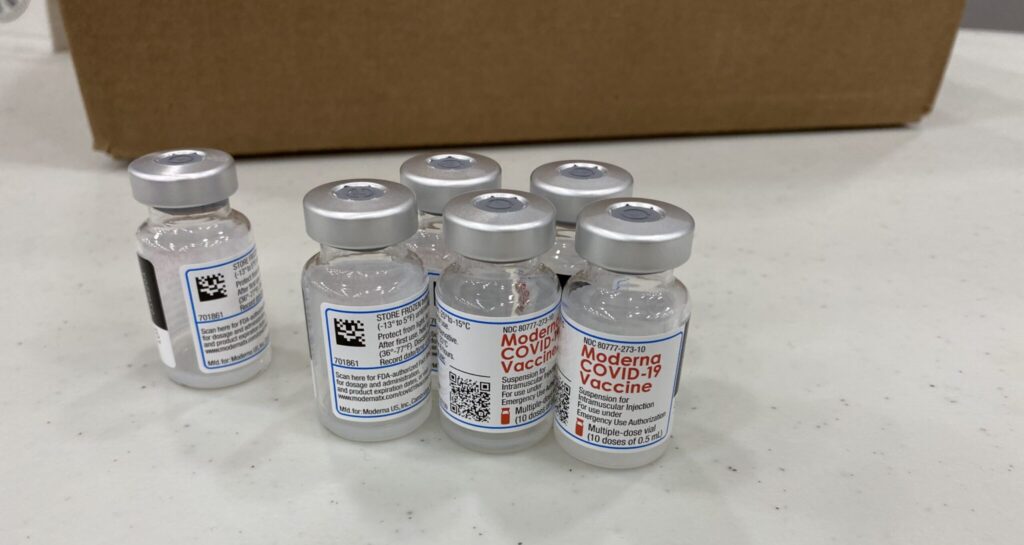In the last month, new COVID-19 variants — known as FLiRT and part of the omicron family — emerged as the dominant strain in the United States.
COVID-19 vaccines are still recommended for protection against the virus, according to the Kentucky Department for Public Health. Kentucky currently has low levels of emergency department visits and hospitalizations for COVID-19, according to the Cabinet for Health and Family Services.

A CHFS spokesman told the Lantern that KP.2 has already been confirmed in the state. Kentucky does not have any KP1.1 cases, spokespan Brice Mitchell said. These variants are called FLiRT.
“These variants are not thought to cause more severe disease but do have some mutations in the spike protein that may make them more resistant to immunity conferred by vaccines and prior infections,” Mitchell said.
Still, the department “continues to recommend that all Kentuckians six months of age and older remain up-to-date with their COVID-19 vaccinations.”
Despite that advice, not everyone is convinced. In the fourth year of COVID-19 — and about 3.5 years since the vaccines came to Kentucky — vaccine misinformation persists, even in Frankfort among elected officials.
During the 2024 legislative session, vaccine misinformation — specifically around the COVID-19 shots — found its way onto the Kentucky Senate floor and into committee meetings.
A spokesperson for the Centers for Disease Control and Prevention told the Lantern that the CDC “continues to encourage Americans to get vaccinated, as the COVID-19 vaccination continues to be the best way to protect against serious illness.”
The Lantern consulted the CDC, Food and Drug Administration and other sources in response to several vaccine claims made by lawmakers this year.
Claim
“COVID-19 vaccines caused “unprecedented rise in sudden cardiac events, miscarriages and stillbirths, blood clots, myocarditis in youth, and sudden deaths among all ages.”
Response
Receiving the shot does not increase the risk of death from non-COVID causes. That conclusion is based on safety monitoring after more than 675 million doses of vaccine have been administered.
COVID-19 vaccination during pregnancy is safe and not linked to an increased risk of miscarriage or stillbirth, according to safety monitoring and research.
CDC monitoring has identified four rare but serious types of adverse events following COVID-19 vaccination. Two of the adverse reactions — thrombosis and Guillain-Barré Syndrome — were associated with vaccines that have been discontinued in the U.S. and are no longer available.
- SUBSCRIBE: Sign up for our newsletters
About 5 people per 1 million doses of vaccine have experienced anaphylaxis, a severe, potentially life-threatening allergic reaction that requires immediate emergency medical treatment. It can occur after any medication or vaccination.
Also, an increased risk of myocarditis – inflammation of the heart – is associated with the Pfizer and Moderna vaccines. Varying by age and sex, the rates of myocarditis after vaccination range from 0 to 188 per 1 million doses.
Research has found that the risk of myocarditis is higher following a COVID infection than after a COVID vaccine, according to the CDC.
CDC and FDA have detected no unusual or unexpected patterns indicating COVID-19 vaccines are causing or contributing to any other serious medical conditions.
Vaccination against COVID-19 reduces the risks of dying from COVID and suffering long COVID.
The most common vaccine side effects are usually mild, such as soreness in the area where the shot was given.
Claim
“The deaths and adverse events recorded to the vaccine adverse events report system that are submitted to this (COVID) vaccine total more than all other vaccines combined, since the CDC implemented the reporting system in 1990.”
Response
This claim has been debunked multiple times by multiple sources.
After COVID-19 vaccines became available, adverse reactions reported to the Vaccine Adverse Event Reporting System (VAERS) did increase, the CDC says, in part because so many people — more than 80% of Americans — received the shot. The 675 million doses of COVID-19 vaccine that have been administered in the United States are more than other types of vaccines. Also, under the emergency authorization for the COVID-19 vaccine, the FDA required health care providers to report any adverse reaction in a patient even if it’s unclear the vaccine was the cause.
This article is republished under a Creative Commons license from Kentucky Lantern, which is part of States Newsroom, a network of news bureaus supported by grants and a coalition of donors as a 501c(3) public charity. Kentucky Lantern maintains editorial independence. Contact Editor Jamie Lucke for questions: info@kentuckylantern.com. Follow Kentucky Lantern on Facebook and Twitter.
Sarah Ladd is a Louisville-based journalist and Kentuckian. She has covered everything from crime to higher education. In 2020, she started reporting on the COVID-19 pandemic and has covered health ever since.






